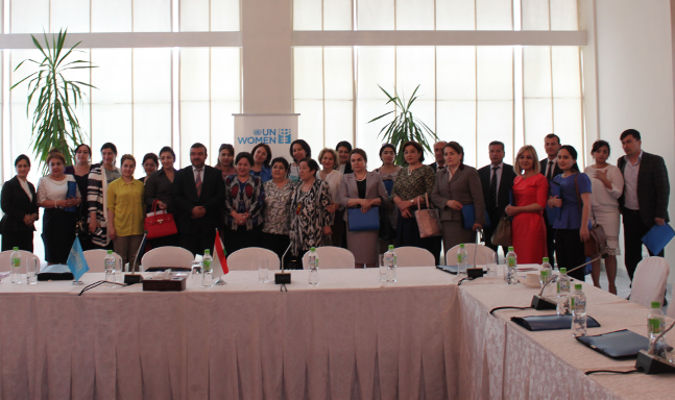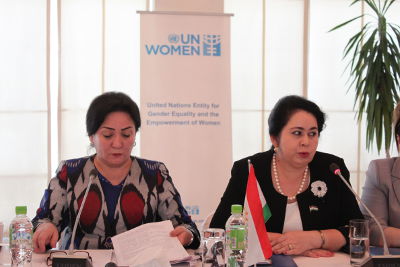Tajikistan commemorates International Day of Families
Date:

To commemorate International Day of Families, which is celebrated every year on 15 May, UN Women office in Tajikistan conducted a roundtable discussion to raise awareness about the impact of social, economic and demographic processes on families, together with the Committee on Women and Family Affairs (CWFA) under the Government of Tajikistan.
Participants from the ministries, the Parliament, Committee on Religion, civil society, Statistic Agency, international organizations and UN agencies discussed the important role that families can play in promoting peaceful relationships within the society and contributing to sustainable development.

Olimi Marhabo, Deputy Head of the CWFA emphasized the importance of promoting a better understanding about the potentials, strengths and needs of families. Qurbonzoda Hilolbi Juma, Chairman of the Committee on Social Affairs, Family and Health Protection of the Majlisi Namoyandagon Majlisi Oli of Tajikistan put a spotlight of how the relationships within families impact children and the society. Viloyat Mirzoeva from UN Women emphasized the role of families and family policies in advancing Sustainable Development Goal 16 in terms of promoting peaceful and inclusive societies for sustainable development.
Participants also discussed the issue of domestic violence in families. Elena Maximenko, Head of PDV (a project on domestic violence) announced the opening of a center for working with domestic violence perpetrators on May 21, 2018.
The representative of the Statistics Agency presented some disaggregated data by sex and age on the country's marriage and divorce rates, including data on the prevalence of early and forced marriage. Niginamoh Rizoeva, representative of the Religious Committee, emphasized the importance of having harmonious relations within families from the perspective of Islam and religion. Shahlo Shoeva, UN Women Project Coordinator, presented the results of UN Women’s “Civil Registration Reform” initiative.
The participants concluded the meeting with emphasizing the importance of family in developing healthy relationships in society.
The following recommendations were made by the participants:
- Working closely with the elder women and involving them in trainings offered by CWFA, the civil society and international organizations on domestic violence,
- Raising awareness about the laws that protect family relations in particular the law on domestic violence
- Strengthening the role of men. 30 per cent of the staff of the CWFA should be men to have gender balance.
Participants further discussed the following:
- Number of people who live in unregistered marriages
- How to track the number of polygamous marriages
- How the changes in legislation regarding the mandatory medical examination ahead of marriage influence the number of marriages
- How does migration affect families?